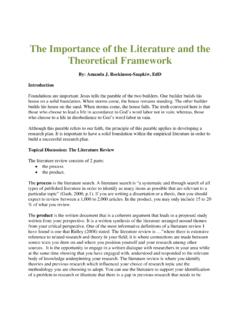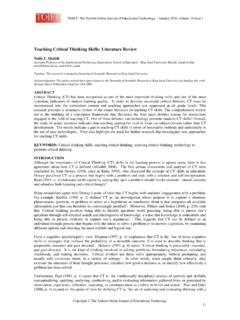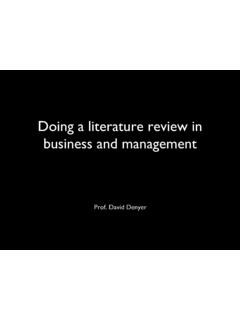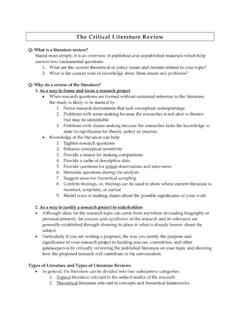Transcription of Constructivist Approaches to Learning in Science and Their …
1 Constructivist Approaches to Learning 193 International Journal of Environmental & Science Education Vol. 3, No. 3, July 2008, xx-xx Constructivist Approaches to Learning in Science and Their Implications for Science Pedagogy: A literature review Mustafa Cakir Marmara University, Turkey Received 09 June 2008; Accepted 11 September 2008 This paper draws attention to the literature in the areas of Learning , specifically, cons-tructivism, conceptual change and cognitive development. It emphasizes the contribu-tion of such research to our understanding of the Learning process.
2 This literature pro-vides guidelines for teachers, at all levels, in Their attempt to have Their students achie-ve Learning with understanding. Research about the constructive nature of students Learning processes, about students mental models, and students misconceptions have important implications for teachers who wish to model scientific reasoning in an effec-tive fashion for Their students. This paper aims to communicate this research to tea-chers, textbook authors, and college professors who involved in the preparation of Science teachers.
3 This paper is divided into two major parts. The first part concentrates on a critical review of the three most influential Learning theories and Constructivist view of Learning and discusses the foundation upon which the Constructivist theory of Learning has been rooted. It seeks an answer to the question of What are some gui-ding principles of Constructivist thinking that we must keep in mind when we consider our role as Science teachers? . The second part of this paper moves toward describing the nature of students alternative conceptions, the ways of changing cognitive structu-re, and cognitive aspects of Learning and teaching Science .
4 Key Words: Learning theories, constructivism, Science pedagogy Introduction Research about the constructive nature of students Learning processes, about students men-tal models, and students misconceptions have important implications for teachers who wish to model scientific reasoning in an effective fashion for Their students. First part of this paper concentrates on a critical review of the three most influential Learning theories and construc-tivist view of Learning and discusses the foundation upon which the Constructivist theory of Learning has been rooted.
5 It seeks an answer to the question of What are some guiding prin-ciples of Constructivist thinking that we must keep in mind when we consider our role as Science teachers? . The second part of this paper moves toward describing the nature of stu-dents alternative conceptions in Science , the ways of changing cognitive structure, and cog-nitive aspects of Learning and teaching Science . It introduces implications for Science educa- International Journal of Environmental & Science Education Vol. 3, No. 4, October 2008, 193-206 ISSN 1306-3065 Copyright 2008 IJESE Cakir 194 tion and Science teacher education as well.
6 Studies that address how teachers might facilitate the ability of students to take control over Their Learning have the potential to inform teachers and researchers alike. Studies of this kind could inform teachers about the implementation of instruction designed to effect conceptual change in Their students, and researchers about the role a teacher plays in bringing about these changes. The Learning Theories of Ausubel, Piaget, and Vygotsky Three cognitive theorists who have been highly influential in understanding the process of human Learning are Jean Piaget, David Ausubel, and Lev Vygotsky.
7 Many view the theories of Piaget, Ausubel, and Vygotsky as distinctly contrasting explanations of cognitive deve-lopment ( Learning ). Ausubel and Vygotsky were more explicit in Their recommendations for teaching than Piaget. However, despite different labels, strong similarities do exist between the cognitive processes described by the three theories. For Piaget, children and adults use mental patterns (schemes) to guide behavior or cog-nition, and interpret new experiences or material in relation to existing schemes (Piaget, 1978).
8 However, for new material to be assimilated, it must first fit an existing scheme. Very similarly, for Ausubel, meaningful information is stored in networks of connected facts or concepts referred to as schemata. New information, which fits into an existing schema, is more easily understood, learned, and retained than information that does not fit into an exis-ting schema (Slavin, 1988). For both theorists then, new concepts that are well anchored by, or attached to existing schemata (or schemes) will be more readily learned and assimilated than new information relating to less established schemata.
9 The same holds true for informa-tion not attached to any schemata at all ( , the case with compartmentalized, or rote lear-ning). The aspects of Vygotsky's work that have received most attention among educators and psychologists are his arguments for the cultural basis of cognition and for the existence of a "zone of proximal development" (Moll, 1990). The latter refers to the idea that there is a zone for each learner, which is bounded on one side by the developmental threshold necessa-ry for Learning and on the other side by the upper limit of the learner's current ability to learn the material under consideration (Vygotsky, 1978).
10 Ausubel defines rote Learning as arbitrary, verbatim, non-substantive incorporation of new ideas into cognitive structure. Information does enter cognitive structure, but with no specific relevance to existing concept/propositional frameworks (Ausubel, 1963). Partly for this reason, rote Learning may involve interference with previous similar Learning , and exhi-bit some of the difficulties in patterns of recall, including fail to notice associations. When a learner encounters situations in which a learner s existing schemes cannot ex-plain new information, existing schemes must be changed or new ones made.















